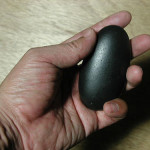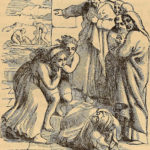We run our website the way we wished the whole internet worked: we provide high quality original content with no ads. We are funded solely by your direct support. Please consider supporting this project.

Sending Evil Spirits
In several infamous biblical depictions of Yahweh in the Old Testament, God is depicted as “sending” spirits to trouble and/or deceive people (Judg 9:22-3; 1 Sam 16:14, 23; 18:10; 19:9; 1 Kg 22:20-3). While there are several exegetical considerations that arguably help alleviate the problematic way these passages implicate God in unethical behavior, I nevertheless think it is undeniable that these passages reflect a fallen and culturally-conditioned perspective of God’s character. But as we interpret them with a cruciform hermeneutic, I submit that we can discern in them not only a God who humbly stoops to accommodate the pen-ultimate views of his people, but also a God who assumes responsibility for all that transpires in his creation, both on earth and in the heavenly realm.
It is significant that every one of the canonical passages that depict God “sending” evil spirits has him doing so as an act of judgment on people who had already acquired a blameworthy character. Interpreted through the lens of the cross, therefore, I submit that we should conclude that God “sent” these evil spirits the same way he “sent” wicked nations to judge other wicked nations. Though the pen-ultimate perspective of the authors of these passages was not above depicting God as the active agent in this sending, we can discern in these portraits God’s wise strategy of using one form evil to vanquish another, always as a stepping stone to his definitive victory over Satan and the kingdom of darkness on Calvary.
The nature of God’s judgment in these passages is also reflected in the organic connection that can be discerned between the sin for which people are being judged and the spirit that is sent as a judgment on that sin. If Yahweh allows a deceiving spirit to incite king Ahab’s prophets to lie, for example, this is only because these false prophets were already liars and because King Ahab did not want to hear the truth in the first place (1 Kg 22:1-23). By allowing a spirit agent to help these false prophets do what they already wanted to do, Yahweh was simply letting the self-destructive consequences of their sin to run its full course. So too, if Yahweh withdraws protection and allows an evil spirit to stir up violent conflict between Abimelech and the men of Shechem, this is only because they already had violence and treachery in their own hearts, as their earlier murderous behavior made perfectly clear (Judg 9:22-23, cf., vss. 1-4).
The fact of the matter is that sin eventually enslaves people to the fallen powers that fuel it (Jn 8:34). And when all merciful attempts to free people from their enslavement and to shield them from the consequences of their sin fail, there comes a point when, as Jeremiah puts it, God allows people to be judged by their own wickedness (Jer 2:19). God thus allows evil spirits that are associated with people’s wickedness—deception in the case of Ahab and violence in the case of Abimelech—to carry out the evil that is in their self-acquired character to carry out.
Yet, reflecting his covenantal commitment to work with his covenant people in the condition he finds them, God stoops to bear the sin of his people by allowing his appearance in the inspired record of his covenantal activities to reflect the culturally-conditioned way his people view him, which is why these passages portray God as the active agent in “sending” these spirits. So too, as a loving, noble king reigning over his creation, God stoops to assume responsibility for all he allows by letting himself be depicted as doing what he in fact merely allows.
Photo credit: Internet Archive Book Images via VisualHunt / No known copyright restrictions
Category: General
Tags: Cruciform Theology, Evil, Judgment
Related Reading

Love Conquers All
Paul prayed in this way for the church at Ephesus: I pray that, according to the riches of his glory, [God] may grant that you may be strengthened in your inner being with power through his Spirit, and that Christ may dwell in your hearts through faith, as you are being rooted and grounded in…

Free Will: What about “natural” evil? Was Hurricane Sandy a Free Agent?
What about natural evil? How does free will help to make sense of this? Greg reflects on the origins of sickness, natural disaster, animal suffering and so on. Hope you’re enjoying the series so far. There’s more to come!

When the Law Demanded the Death Penalty
The Sinai covenant is significantly structured around violence. It motivates behavioral conformity by promising rewards and threatening violence. Without the threat of violence, the law looses its “teeth.” If the law is an acquiescence to sin, then the divinely sanctioned violence that is associated with it must also be considered an acquiescence to sin. The…

Who Killed Ananias and Sapphira? A Response to Paul Copan (#6)
In his critique of Crucifixion of the Warrior God (CWG), Paul Copan makes a concerted effort to argue that the God revealed in Jesus Christ and witnessed to throughout the NT is not altogether non-violent. One of the passages Copan cites against me is the famous account of Ananias and Sapphira falling down dead immediately…

Cross Centered Q&A
For those within driving distance of Saint Paul, MN, we invite you to join us for a free event. Greg will be discussing his new book Crucifixion of the Warrior God with Bruxy Cavey (Pastor of The Meeting House in Toronto) and Dennis Edwards (Pastor of Sanctuary Covenant Church in Minneapolis). Don’t miss this opportunity to hear Greg…

Getting Honest about the Dark Side of the Bible
Eddy Van 3000 via Compfight While most of the Bible exhibits a “God-breathed” quality, reflecting a magnificently beautiful God that is consistent with God’s definitive revelation on the cross, we must honestly acknowledge that some depictions of God in Scripture are simply horrific. They are included in what is sometimes called “the dark side of…
